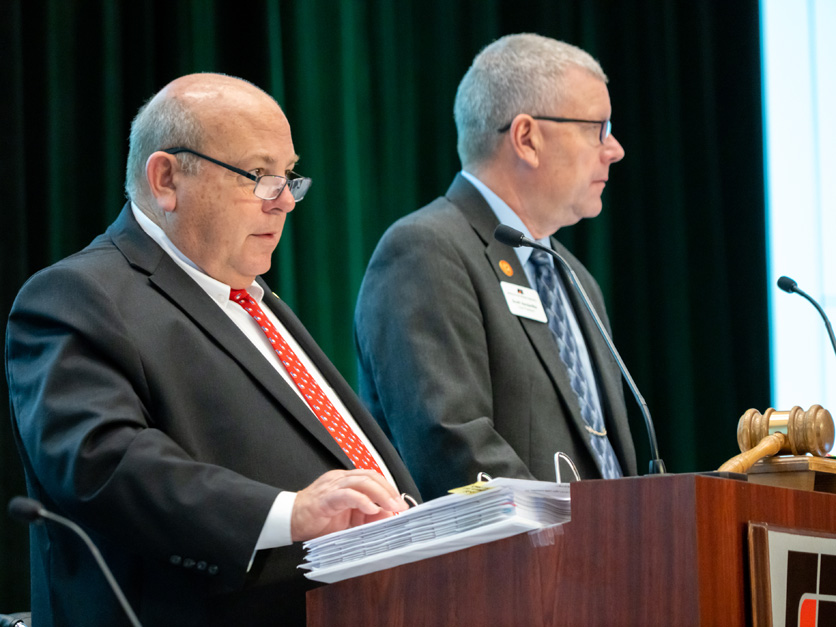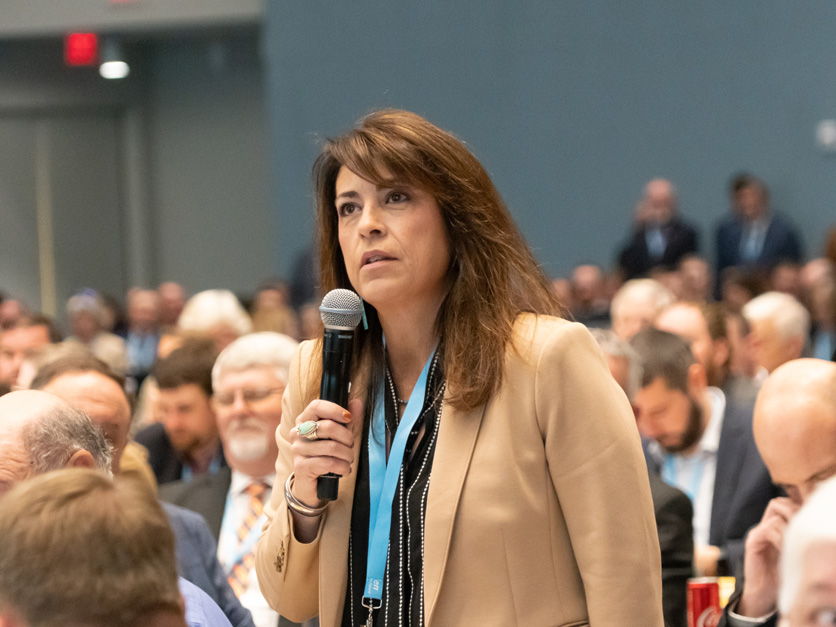Delegates to the American Farm Bureau Federation’s annual meeting voted Tuesday to seek more funding for farm bill programs this year, despite some members’ concerns about the political optics of the appeal and the impact on federal budget deficits.
The nation’s largest farm organization had already gone on record supporting increases in the reference prices that trigger payments under commodity programs, and Tennessee Farm Bureau President Eric Mayberry said it was time to take the next step and ask Congress for more money.
“Everyone in the room knows the inflationary pressures we’re dealing with,” said Mayberry, who proposed the resolution that was eventually adopted, 227-112.
AFBF President Zippy Duvall told Agri-Pulse after the debate, “I don't know if it's ever a good time to say we need more money. But really and truly what we're looking at is the food security of our country and making sure that agriculture stays healthy.”
The new Farm Bureau policy doesn't commit the group to lobby against cuts to nutrition programs that may be proposed by House Republicans. “We don't have a policy on that,” Duvall told Agri-Pulse. However, during his opening convention comments, Duvall said “We must keep farm policy unified with nutrition policy. When ag and hunger advocates lock arms, we have our best chance of success, which we must never take for granted."
Some AFBF members raised concerns about the timing of the appeal and said there was no guarantee additional funding would be directed toward commodity programs.
“It’s tough for me to swallow for us all wanting smaller deficits, less spending, and us asking for more money,” said Jon Sparks, a member of the Indiana Farm Bureau.
 Farm Bureau President Zippy Duvall (left) and Vice President Scott VanderWal (right) preside over delegate session. (Photo: AFBF)
Farm Bureau President Zippy Duvall (left) and Vice President Scott VanderWal (right) preside over delegate session. (Photo: AFBF)
Arizona Farm Bureau President Stefanie Smallhouse argued that it was bad timing to ask for more money, given the change in power in Congress. House Republican leaders are planning to use a battle over increasing the federal debt ceiling to force Senate Democrats and the White House to agree to spending cuts.
“We have a very, very uphill battle with the current situation in the House,” Smallhouse said.
The delegates, meeting in San Juan, Puerto Rico, this year, endorsed some changes to federal dairy policy and called for more flexibility in USDA disaster assistance programs and an expansion of crop insurance to more specialty crops.
AFBF has new policy language calling for "enhancements" to the Whole Farm Revenue insurance program to "provide a more appropriate level of affordable coverage." Another new policy proposes increasing coverage levels in the Noninsured Crop Disaster Assistance Program (NAP).
The delegates agreed that Congress should use the farm bill to change the way milk is priced under federal milk marketing orders rather than wait for a USDA hearing process. AFBF wants to return to the pricing formula used before the 2018 farm bill enacted a change that was the result of an agreement between dairy processors and producers. The change hurt some producers because of market disruptions in 2020.
The delegates had some spirited debates over environmental policy but largely affirmed AFBF’s support for voluntary measures to address climate change and other concerns. Their new policy registers opposition to linking crop insurance to climate-related measures and opposes a Securities and Exchange Commission plan that would require companies to track greenhouse gas emissions from farms.
The delegates divided over an Illinois policy to support the sequestration of carbon dioxide emitted from the production of biofuels and crop nutrients.
Biofuel projects plan to use CO2 pipelines to lower the carbon scoring of their products. But delegates from Iowa, a state where some landowners have resisted the siting of carbon dioxide pipelines on their land, argued against endorsing carbon sequestration.
On other issues, delegates adopted a Maryland resolution adopting a broad definition of regenerative agriculture as a “production system that minimizes environmental impacts, maximizes production and increases the productively of soil over time.”
 Arizona Farm Bureau President Stefanie Smallhouse (Photo: AFBF)
There is no legal definition of regenerative agriculture, but food companies are increasingly encouraging farmers to adopt practices associated with the term that can improve soil health and water quality.
Arizona Farm Bureau President Stefanie Smallhouse (Photo: AFBF)
There is no legal definition of regenerative agriculture, but food companies are increasingly encouraging farmers to adopt practices associated with the term that can improve soil health and water quality.
The definitions used by agronomists, food companies and farm and environmental groups vary widely. A 2020 University of Colorado report said some definitions are based on processes, others on outcomes.
Some delegates didn’t want AFBF to address the issue, suggesting that would lend credence to the term. But Indiana delegate Marybeth Feutz, a veterinarian, said it was “the perfect opportunity to define these terms and make them mean what we want them to mean, not what someone else chooses they should be.”
Missing from this year's policy debate was a struggle over cattle pricing. A year ago, the group voted to oppose mandating minimum levels of cash purchases of cattle by meat processors, an issue that sharply divided the delegates on regional lines.
The Iowa Farm Bureau came back this year with a very different proposal supporting a requirement that packers pay feed costs for cattle they buy but don't take possession of within at least two weeks. The Iowa Farm Bureau came up with the proposal after a delegation met with producers in Texas last year. The Iowans learned the packers commonly cover those costs in Texas, a state where there also is strong resistance to cash trade mandates. The measure passed 254-80.
For more news, go to Agri-Pulse.com.


